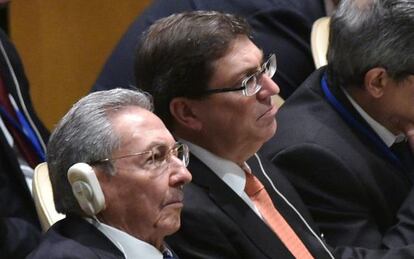Obama uses UN speech to ask US lawmakers to lift Cuban embargo
Castro demands compensation for “human suffering” caused by the 55-year-old blockade

US President Barack Obama on Monday walked up to the podium at the United Nations General Assembly and asked Congress to lift the 55-year economic embargo against Cuba as the two countries continue to thaw their diplomatic relations.
The historic gesture came one day before the US leader was scheduled to meet with Cuban President Raúl Castro in New York to discuss bilateral relations. It will be their second encounter in six months.
I am confident that our Congress will inevitably lift an embargo that should not be in place anymore”
“I am confident that our Congress will inevitably lift an embargo that should not be in place anymore,” said the president, who was applauded by many delegates at the UN General Assembly. “Change won’t come overnight to Cuba, but I’m confident that openness, not coercion, will support the reforms and better the life the Cuban people deserve.”
It wasn’t the first time that Obama had asked US lawmakers to lift the embargo since the US and Cuba began to work on normalizing diplomatic relations. But it was the first time that a US president had called for the end of the embargo and spoke about US policy toward Cuba at a General Assembly meeting.
It was also the first time that Castro had addressed the General Assembly since he took over the Cuban presidency from ailing brother Fidel.
“We continue to have differences with the Cuban government,” Obama said. “We will continue to stand up for human rights but we address these issues through diplomatic relations and increased commerce and people-to-people ties.”
Castro, who spoke later in the day and after Obama had left the General Assembly hall, listed his grievances against the US government, including demands that the United States return the Guantánamo naval base to Cuba; stop transmitting radio and television broadcasts sponsored by the US government and radical Cuban exile groups; and make reparations for the “human suffering” the embargo has had on the Cuban people.
The Cuban leader said that the only way to have normal relations with the United States is by lifting the embargo, which was introduced by President Dwight D. Eisenhower in 1960.
Castro pledged his solidarity with Argentina in its demands for Britain to return the Falkland Islands
“It is unacceptable to distort the promotion and protection of human rights, using it in a selective and discriminatory way to impose political decisions,” said Castro, who is now 89.
He also took the opportunity to show support for his regional allies.
Venezuela, Castro said, “can always count on Cuba’s solidarity as it faces attempts to destabilize and undermine the Constitutional order and destroy the work begun by our colleague Hugo Chávez Frías, which continues under President Nicolás Maduro Moros, in favor of the Venezuelan people.
The Cuban leader also pledged his “firm and unyielding solidarity” with Ecuador’s Rafael Correa, whom he said was also “a target of the same destabilization policy that is being applied against other progressive governments in the region."
Castro also said that Cuba supports Argentina in its plight to win control over the disputed Falkland Islands, and pledged support for Brazilian President Dilma Rousseff “in her defense of important social achievements and stability in her country.”
English version by Martin Delfín.
Tu suscripción se está usando en otro dispositivo
¿Quieres añadir otro usuario a tu suscripción?
Si continúas leyendo en este dispositivo, no se podrá leer en el otro.
FlechaTu suscripción se está usando en otro dispositivo y solo puedes acceder a EL PAÍS desde un dispositivo a la vez.
Si quieres compartir tu cuenta, cambia tu suscripción a la modalidad Premium, así podrás añadir otro usuario. Cada uno accederá con su propia cuenta de email, lo que os permitirá personalizar vuestra experiencia en EL PAÍS.
¿Tienes una suscripción de empresa? Accede aquí para contratar más cuentas.
En el caso de no saber quién está usando tu cuenta, te recomendamos cambiar tu contraseña aquí.
Si decides continuar compartiendo tu cuenta, este mensaje se mostrará en tu dispositivo y en el de la otra persona que está usando tu cuenta de forma indefinida, afectando a tu experiencia de lectura. Puedes consultar aquí los términos y condiciones de la suscripción digital.









































